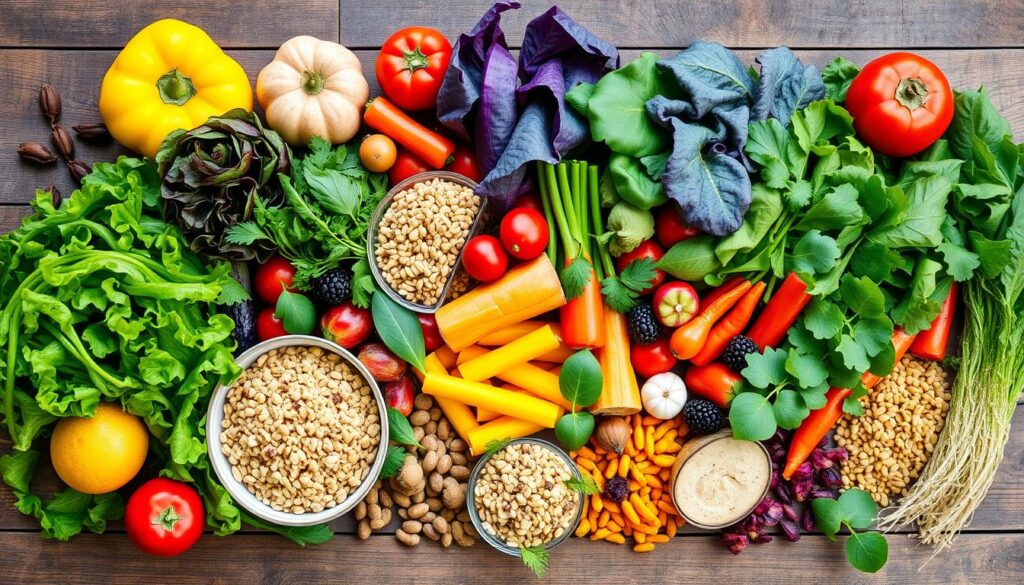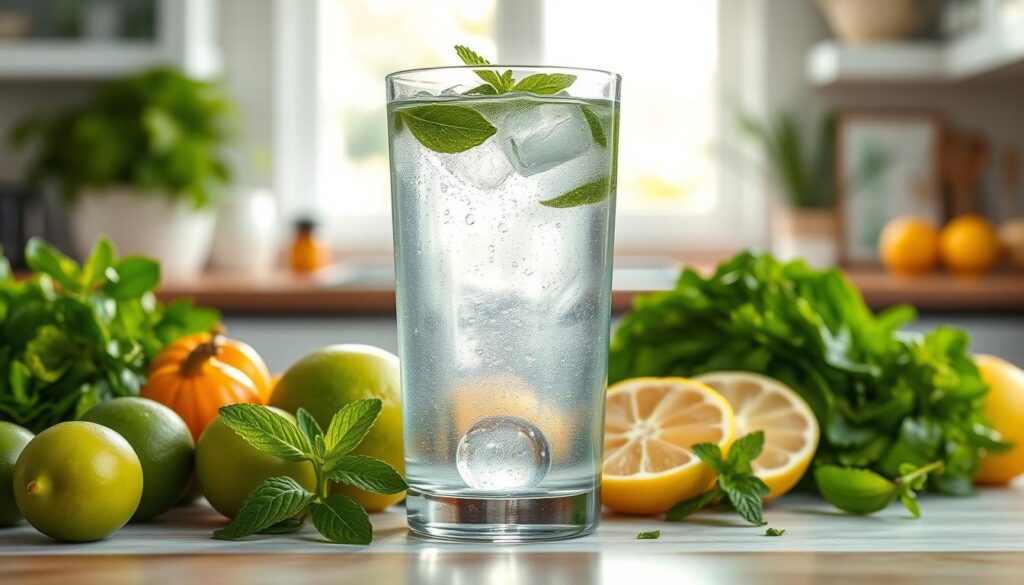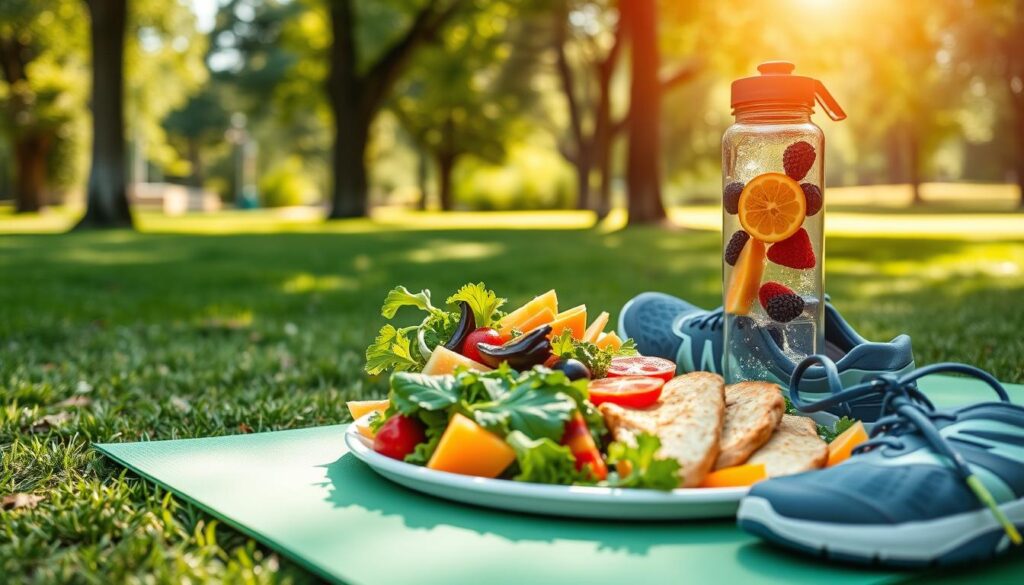It’s hard to lose weight fast, but it’s doable. The trick is to make small, healthy changes that you can keep up with. Losing 1-2 pounds a week is the best way to lose weight and keep it off.
Creating a calorie deficit is key. This means eating well and exercising regularly. But it’s not just about the numbers. Your motivation and setting goals are also very important. By knowing how weight loss works and making a plan that fits you, you can get healthier and look better.
Key Takeaways
- Gradual weight loss of 1-2 pounds per week is the most sustainable approach.
- Personal motivation and goal-setting are key to long-term success.
- Calorie deficit through balanced nutrition and exercise is the foundation of weight loss.
- Understanding the science behind weight loss can help you create an effective strategy.
- Tracking food intake and having a support system can aid in maintaining weight loss efforts.
Understanding the Science Behind Rapid Weight Loss
Trying to lose weight fast can be hard. But knowing the science helps. The key is burning more calories than you eat. This makes your body use fat for energy, helping you lose weight.
The Role of Caloric Deficit
To lose weight quickly, you need to eat fewer calories. You can do this by eating less and moving more. Aim for a 500-750 calorie deficit each day. This can help you lose 1-1.5 pounds a week. But don’t eat too few calories, as it’s bad for your health.
How Metabolism Affects Weight Loss
Your metabolism is key to losing weight. It’s how fast your body burns calories. Things like muscle, size, age, and sex affect it. Building muscle helps your metabolism, while being inactive slows it down.
The Impact of Hormones on Fat Burning
Hormones like insulin, cortisol, and thyroid hormones matter for fat burning. High insulin levels make you store fat. Hormone imbalances can slow your metabolism. Fixing these issues can help you burn fat better.
Knowing the science of losing weight fast helps you do it better. Remember, losing weight safely takes time, patience, and understanding your body.
“Sustainable weight loss is not about quick fixes, but rather a lifelong commitment to healthy habits and lifestyle changes.”
Creating a Sustainable Weight Loss Strategy
Long-lasting weight loss isn’t about quick fixes. It’s about making healthy choices and staying active. Focus on changes that feel natural, not just temporary.
Start by setting SMART goals. Aim to lose 5-10% of your weight first. This can lead to big health benefits, even if you’re still a bit overweight.
Make sure to eat better and move more. Aim for 150 minutes of activity per week. Mix up your workouts to keep things interesting and boost your health.
Remember, losing weight is a journey. Enjoy your small wins and don’t get too hard on yourself. Even a little weight loss can make a big difference in your health.
By sticking to sustainable weight loss habits and making long-term lifestyle changes, you’ll reach your health goals. Find a balance that works for you, every day.
“The secret of getting ahead is getting started. The secret of getting started is breaking your complex overwhelming tasks into small manageable tasks, and then starting on the first one.” – Mark Twain
| Key Strategies for Sustainable Weight Loss | Benefits |
|---|---|
|
|
Essential Nutrition Principles for lossing weight fast
To lose weight quickly, you need to know the right nutrition. We’ll talk about protein, healthy fats, and carbs. These are key to reaching your weight loss goals.
Protein Requirements for Optimal Results
More protein can really help with weight loss. Try to eat 25-30 grams of protein at each meal. This keeps you full and helps keep your muscles strong.
Studies show eating a lot of protein for breakfast helps a lot. It can stop you from feeling hungry later in the day.
Healthy Fats and Their Benefits
Healthy fats are good for losing weight. Foods like olive oil, avocados, and nuts are full of them. They make you feel full and help your body work right.
Smart Carbohydrate Choices
Choose complex carbs like whole grains, veggies, and fruits. A study found eating too many refined carbs can make you gain weight. So, pick the good carbs to help you lose weight and stay healthy.
Eating a diet rich in protein, healthy fats, and complex carbs is key. It helps you lose weight fast and keep it off. Follow these tips and you’ll see the weight drop.
“Nutrition is the foundation for weight loss success. By focusing on the right balance of macronutrients, you can fuel your body for optimal fat-burning and overall health.”
The Power of Plant-Based Foods in Weight Management
Looking for a good way to lose weight? Plant-based foods are very helpful. People who eat plants tend to weigh less than those who eat meat. Men on a plant-based diet have a BMI of 22.5, and women have a BMI of 22.0. This is lower than meat-eaters, who have a BMI of 24.4 for men and 23.5 for women.
Eating plants also lowers harmful compounds in your body. These compounds are called AGEs. Plant-based diets reduce AGEs by 79% compared to diets with meat and dairy.
Adding fiber-rich foods like whole grains, legumes, fruits, and veggies helps with weight loss. Whole grains can lower your risk of being overweight. Legumes and fruits help you lose weight too.
| Dietary Approach | Average BMI (kg/m2) |
|---|---|
| Plant-based | 22.5 (men), 22.0 (women) |
| Meat-eaters | 24.4 (men), 23.5 (women) |
By cutting out animal products and oils, you can lose weight. A study showed people on a plant-based diet lost 13 pounds in 14 weeks. Many kept off 11 pounds a year later.
Ready to use fruits and vegetables for weight loss? Add more plant-based foods to your diet. Your body and waistline will be happy.

Strategic Meal Planning and Portion Control
Weight loss is more than just cutting calories. It’s about making a plan that works for your body. By planning meals and controlling portions, you can see better results and live healthier.
Timing Your Meals for Maximum Effect
When you eat can affect your weight loss. Eat at regular times to keep your metabolism up. This helps avoid big ups and downs in blood sugar, which can make you want to eat too much.
Understanding Serving Sizes
Knowing how much to eat is key to losing weight. Serving sizes are often different from what labels say. Use small plates and measuring tools to help you eat the right amount.
Meal Prep Fundamentals
Meal prep can change your weight loss game. It lets you have healthy, portioned meals ready. This makes it easier to stay on track and avoid bad choices.
| Meal Plan | Calories | Protein | Carbs | Fiber | Fat | Sodium |
|---|---|---|---|---|---|---|
| Plan A | 1,203 | 66 g | 177 g | 34 g | 32 g | 1,186 mg |
| Plan B | 1,500 | 45 g | 139 g | 30 g | 58 g | 1,741 mg |
| Plan C | 2,000 | 66 g | 177 g | 42 g | 32 g | 1,109 mg |
For weight loss, balance is everything. Meal planning, portion control, and timing are important. These habits will help you on your path to a healthier life.
Hydration and Weight Loss Connection
Maintaining proper hydration is key for weight loss. Studies show drinking more water helps lose weight, even without diet or exercise changes. Try to drink 8 ounces of water 8 times a day, or about 64 ounces total.
Drinking water before meals is very helpful. A 2016 study found people who drank two glasses before eating ate 22% less. This shows staying hydrated can cut down on cravings and aid in weight control.
Hydration also aids in burning fat for energy. A 2016 review noted dehydration slows down fat burning. So, staying hydrated helps burn fat more efficiently, aiding in weight loss.
| Hydration Benefit | Relevant Research |
|---|---|
| Increased metabolic rate | Drinking about two cups of 71°F water led to a 30% average increase in the metabolic rates of 14 healthy adults in a 2003 study. |
| Reduced calorie intake | Choosing water over higher calorie alternatives such as juice or soda can result in a reduction of 250 calories. |
| Improved weight loss | Overweight and obese women who replaced diet beverages with water after meals showed greater weight reduction in a 2015 study. |
Staying hydrated is vital for weight loss and overall health. Even a little dehydration can hurt brain function, as shown in a study in the Journal of the American College of Nutrition.

“Drinking a lot of water” was reported by 26.3% of participants as an attempt to lose weight in a 2019 study.
To get the most from hydration for weight loss, aim for 9 cups (74 ounces) for women and 13 cups (101 ounces) for men daily. Eating foods high in water and swapping sugary drinks for water can also help with weight management.
Exercise Protocols for Accelerated Fat Loss
To lose weight, you need to do more than just one thing. You should mix cardio with strength training. This way, you burn fat better and get fitter.
High-Intensity Interval Training Benefits
HIIT is a great way to exercise. It mixes short, hard work with rest. This method burns more calories than other exercises.
HIIT also helps you burn fat for up to 24 hours after you stop. It’s very good for you.
Strength Training for Enhanced Results
Strength training is key for losing weight. It helps you build muscle. This means you burn more calories, even when you’re not moving.
Try to do strength training 3-5 times a week. Focus on exercises that work many muscles at once.
Optimal Workout Scheduling
It’s important to balance your workouts with rest. Aim for 300 minutes of activity each week. Mix cardio, HIIT, and strength training.
Don’t forget to rest. Rest days help your muscles grow. This boosts your metabolism and fat burning.
| Exercise Type | Calories Burned per Minute | Additional Benefits |
|---|---|---|
| HIIT | 25-30% more than other exercises | Keeps body in fat-burning mode for up to 24 hours post-workout |
| Strength Training | 7.6-9.8 calories per minute | Increases resting metabolic rate, builds muscle mass |
| Brisk Walking | 7.6-9.7 calories per minute | Can burn an extra 150 calories per day with just 30 minutes |
| Swimming | 9-11.6 calories per minute | Reduces risk of heart disease, stroke, and certain cancers |
| Yoga | 108-168 calories per 30-minute session | Promotes mindful eating habits and overall well-being |
By mixing HIIT, strength training, and cardio, you get a great fitness plan. It helps you lose weight and stay healthy.
Sleep and Stress Management for Weight Control
Getting enough sleep and managing stress are key for losing weight. Research shows sleep quality affects weight loss and body shape.
Try to sleep 7-9 hours each night. Not sleeping well can make you hungry for bad foods. Make your sleep area calm and avoid screens before bed.
Also, handle stress well. Too much stress can make you gain weight by raising cortisol levels. Try meditation, yoga, or hobbies to relax. Good sleep and stress control help you lose weight and feel better.

